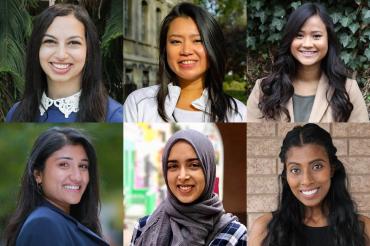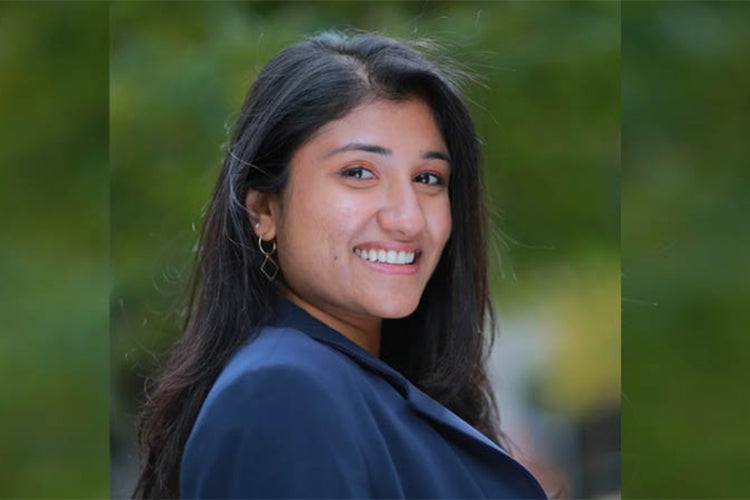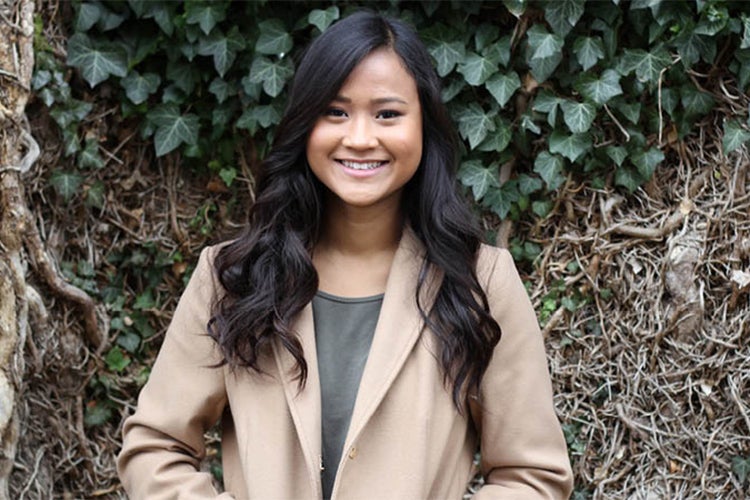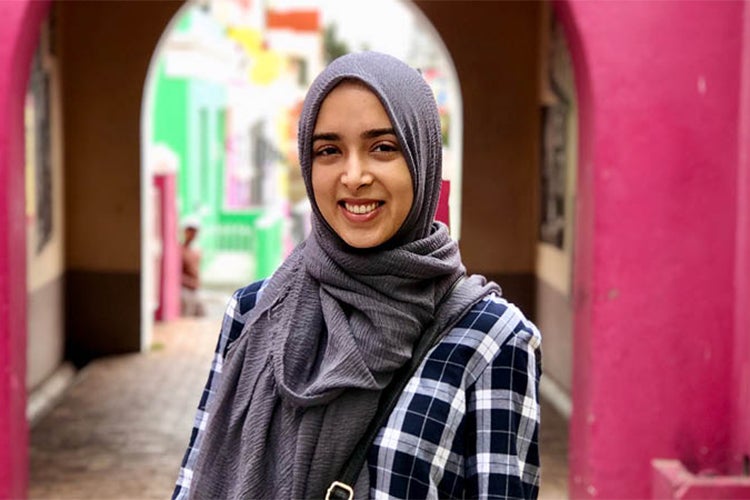Newly minted graduates of rehabilitation sciences programs at the University of Toronto will walk across the stage at Convocation Hall on Tuesday to receive their degrees. The Faculty of Medicine’s Ciara Parsons asked soon-to-be alumni of occupational therapy, physical therapy, speech-language pathology and the Rehabilitation Sciences Institute to share why they are passionate about their fields and what drives their professional and academic work.
Here are their responses:
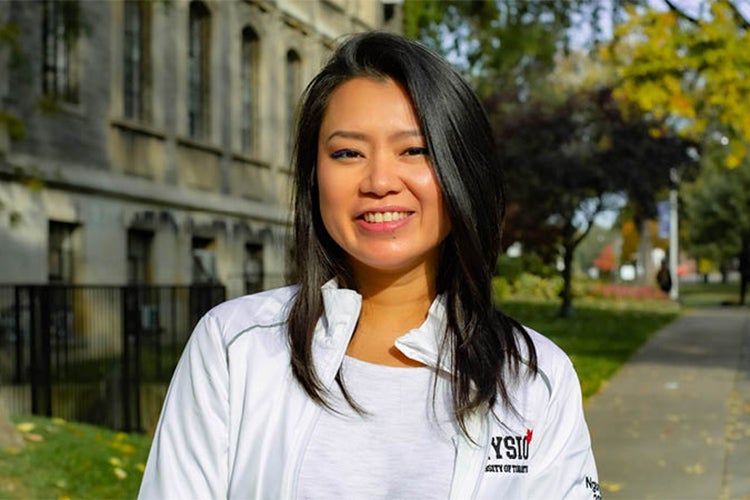
Thi-Ut Nguyen
Master of Science in Physical Therapy
I worked as a personal support worker with a 54-year-old patient who was involved in a horrific car accident. When I started working with him, he was at five months post-injury. He had a tracheostomy and a gastrotomy tube. He was fully dependent for bed mobility and transferred via a lift. I worked with him for a period of one year. By the time he was discharged, he was walking and moving about independently with a walker.
Witnessing his extraordinary recovery journey sparked my interest in physical therapy. I was impressed by the impact early intensive physical therapy has on neuro-motor rehabilitation and I was fascinated by the concept of movement as medicine. Determined to pursue a career as a physiotherapist, I went from being a working mother with no high school degree, to being accepted into the transitional year program at the University of Toronto and I never looked back.
I think it’s important to continue to set goals that are almost dreams for my own personal growth.

Mary Boulos
Master of Science, Rehabilitation Sciences Institute
One of the most memorable moments of my program was working with the Fred Victor agency in Toronto. Our lab’s clinical arm, the Telerehab Centre for Acquired Brain Injury, strived to provide neuropsychology services to individuals in the justice system experiencing brain injury and mental illness. There is an incredibly high prevalence of brain injury in the justice system; however, access to neuropsychology services is almost non-existent.
By collaborating with Fred Victor, we were able to begin addressing this gap by connecting clients with neuropsychology services and raising awareness of the need for services and support during the justice process. Having the opportunity to advocate for increased awareness and support of brain injury through presentations to clinicians, judges and lawyers has inspired me to continue advocacy work throughout my career.
Now, as a first-year medical student at McMaster University, I hope to bring forward the lessons I learned from the individuals I worked with during my [master of science] training at the University of Toronto and continue advocating for increased access to mental health care, home care and assisted living supports for patients across Canada.
Sanjana Shellikeri
Doctor of Philosophy, Rehabilitation Sciences Institute – speech-language pathology stream program
My mother was diagnosed with amyotrophic lateral aclerosis (ALS) in 2010 and passed away in March 2019. I met Yana Yunusova through my mother in 2012, as she was a research participant in one of her speech studies. I was a recent undergraduate in neuroscience at the time and was very interested in contributing to the medical field. Although I didn’t have much knowledge in speech-language pathology, I was drawn to the idea of research in a disease that was so close to my heart. After meeting Yunusova and learning about her work, I knew this line of research would be a great fit for me.
I hope to follow the academic path as an independent investigator and contribute research to the study of neurodegenerative diseases, such as ALS, Parkinson’s disease, Alzheimer’s disease and other dementias. I am currently pursuing a postdoctoral research fellowship at the University of Pennsylvania’s Frontotemporal Degeneration Center and aspire to improve the lives of people with neurodegenerative conditions and work towards a real-world impact.
Daniela Chok
Master of Health Science in Speech-Language Pathology
As social beings, a person’s quality of life can be drastically affected by their ability to effectively express themselves and understand others’ messages. I was attracted to the speech-language pathology program because I wanted to work with people with communication disorders to enhance their quality of life. This is a rewarding field where I can work with others to establish and maintain meaningful relationships.
Through completing this program, I have learned that every situation and person is unique. As speech-language pathologists, we need to keep in mind both the diagnoses we are working to address and the patients themselves. Two people with the same diagnosis may have very different clinical presentations. The ability to integrate my classroom knowledge while recognizing the person’s unique situation is the beauty of balancing the art and science that exists within this field.
Janany Jeyasundaram
Master of Science in Occupational Therapy
As the daughter of refugees, I have a strong sense of being between two worlds – the world of my parents in their homeland, which I have imbibed and internalized, and the world I was born into, where I do not fully belong. I have witnessed legacies of trauma both in my personal circles and in my role as an occupational therapy student. Throughout my occupational therapy education, I actively sought opportunities to further my understanding of equity and move the profession towards greater inclusion of vulnerable populations.
As a contextually situated practice, occupational therapy can advance healing work that benefits both individuals and communities. For many culturally diverse populations, individual healing is contingent upon the healing of families and communities. My occupational therapy education challenged me to reflect on client values by developing a greater appreciation for interdependence and interconnectedness. I feel better equipped to disrupt the notion of self-care in the traditional sense and expand our understanding of what it means for vulnerable populations to collectively heal from histories of trauma.
Sahar Panju
Master of Health Science in Speech-Language Pathology
Through the speech-language pathology program, I’ve learned a lot about what it takes to be a good clinical therapist, but, more importantly, what it takes to be a good partner in care, as there is so much more to rehabilitation than just therapy. Being present for what is happening in a person’s life, beyond their impairment, has been an incredibly valuable lesson, both personally and professionally.
As a graduate of the program, I hope to continue to add to the foundation I’ve built and grow as a clinician. I recognized that one of the most important aspects of being a clinical therapist is to remain flexible and make yourself available to understanding new and sometimes challenging ideas. With the profession changing on a daily basis, continuing education is especially important. The program may have finished, but my education certainly hasn’t.
